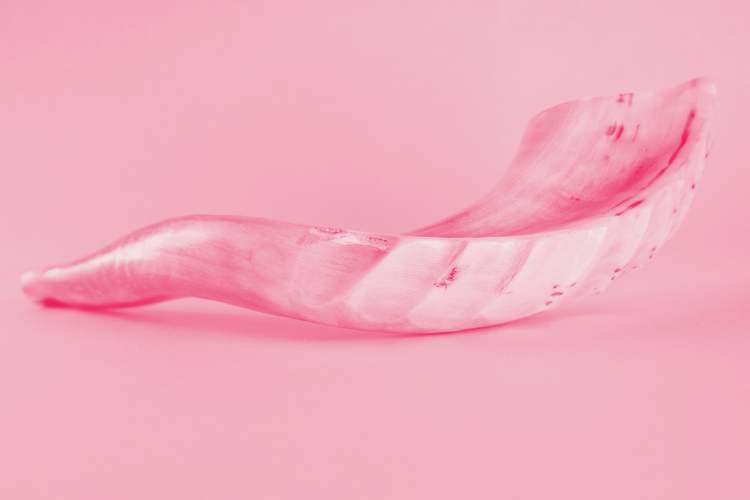
Pink Ribbons and Days of Awe
Two Octobers ago, I had what was supposed to be a routine mammogram. The scan showed an abnormality; one biopsy later, I was diagnosed with ductal carcinoma in situ, or stage 0 breast cancer. My relief at the cancer being found so early was tempered by how widely it had spread, and I had a double mastectomy followed by radiation.
I finished my radiation treatment in May 2021, and spent that summer happily getting back into the routines that cancer had disrupted. Then October, also known as Breast Cancer Awareness Month, rolled around, and reminders were everywhere in the form of the inescapable pink ribbon.
Years ago, before the term “pinkwashing” was common, a friend of mine went on a glorious rant about how, every October, it was impossible to ignore how many companies used pink ribbons in their advertising. It was disingenuous, she said, for corporations that had nothing to do with health or wellness to weave messages of support and compassion in their ads for cars or fried chicken or lipstick. You’re right, I said when she was finished. I never thought about it before, but you’re so right.
Encountering those ads and gestures five months after being treated for breast cancer filled me with rage and disgust. If corporations really wanted to help people affected by breast cancer, I thought, they should guarantee their employees comprehensive health insurance, provide paid family leave, and support government policies that ensure everyone in this county can access healthcare. That was the change I wanted to see, not pink ribbons in magazines and on lapels.
Now it’s October again. The worst of my surgery and radiation scars have faded and I’m on the cusp of being declared officially in remission. I should be moving past cancer, but when I saw a pink ribbon in an advertisement the other day, all I felt was anger and loss.
This year, the beginning of October fell in the middle of the Days of Awe, Yamim Noraim.
When my sister and I were kids, we would dissolve into giggles as we’d “apologize” for all the slights and insults we’d visited on each other during the previous twelve months, our sins becoming more and more ridiculous the longer we kept at it. But as an adult, I’ve gotten better at reflecting about what I could have done better in the past year, repenting for my mistakes, and thinking about how to avoid the same shortcomings in the year ahead. Sometimes I’ve even sought out people I’d wronged and formally apologized, an experience that always felt appropriately awkward and difficult. And I’ve often exited the synagogue on Yom Kippur feeling like I’d “reset” myself and was now ready for the year to come.
Seeing that damn pink ribbon, though, upended those plans. It made me realize that I’m still mourning the body that I had two Octobers ago, the one that I can literally never get back, changed as it is by mastectomy, reconstruction, and radiation. My mixed feelings don’t stop with the physical: I reflexively wince when the word “survivor” is applied to me, because I have long hated how the language of war is too often used to describe living with illness, but I don’t have a better term to use when I have to sum up my medical history. And I’m still unable to acknowledge the very good odds that cancer really has been banished from my body. It appears that two years isn’t long enough for me to have fully moved from who I was pre-cancer to whoever I am now.
The idea of “acceptance” has always felt too passive, which may be why I’ve never spent a lot of energy thinking about what it means. Every time over the past twenty-four months that I have tried to accept that I have cancer, for example, I’ve felt like I’m just reiterating that something bad happened to me for reasons beyond my control. What could be more passive than that?
But I don’t want to give a picture in a magazine – someone else’s symbol, not mine – so much weight and space in my brain, on my soul. I want to acknowledge that while the pink ribbon means many things to many people, to me it can just be a pink ribbon, and move on. That feels like a good first step in accepting the more radical changes that cancer has brought to my life.
And doing this during the Days of Awe, which aren’t just about reflection and repentance but also reconciliation, felt like the best time to start. Reconciling who I was before cancer with who I am now isn’t as fun as laughing with my sister about our childhood sins or as bracing as apologizing to someone in person. But maybe wrestling with the pink ribbons as the holidays come to a close this year can help me put the anger and confusion to rest, and move into a year, and a life, that is renewed.



